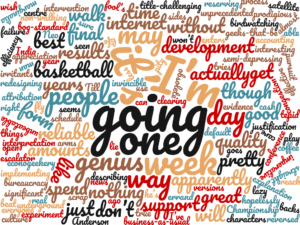Hi all,
I’m not going to lie – this week has been pretty tepid for the normally reliable econogeekery that the internet seems to be so reliable for. Rather than spend the first day of the County Championship scouring the internet for clickbait (and miss Glamorgan being 26-6 at one point – thanks, Tom), I’m going to go rogue: instead of keeping all the general marginalia for the last link, this week most of them will be the random stuff that was actually interesting, and hopefully next week the geeks-that-be online will return to form.
1. I’ll start with some business-as-usual, though, and open on a piece of semi-depressing development news. Owen Barder reports on what sounds like some bog-standard rent seeking, with separate arms of the same bureaucracy coming to an agreement to reduce efficiency of the development intervention they are being charged with implementing in order that each get paid. Only it’s not some hopelessly corrupt Government he’s describing, but the UN system in Syria. All donors care about attribution of results (that is, being able to prove the reach of the support they provided, as a way of accounting for their funding). But it’s pretty poor form if that imperative results in redesigning support to be less effective.
2. I’ve seen (and linked) versions of this argument in the past: there may be a merit in doing ‘nothing’ in pursuit of achieving more. Darwin, Dickens and countless other characters of genius apparently cultivated the habit of working for relatively few hours per day, spending significant amounts of time going for leisurely walks, gardening, napping, birdwatching [I may have added this to the list without a scrap of evidence] and so on – and yet produced prodigious amounts of high quality work. Two caveats – the obvious explanation is that at the height of genius, one can spend a great deal of time goofing off without much loss in quality. And secondly, all that ‘nothing’ was probably integral to their thought process. Sometimes the best way of thinking about a problem is obliquely. Anyway, I’m going to use this as justification for my daily 3pm coffee, and I pity the fool who tries to schedule a meeting during it.
3. This week in things I wish weren’t true: apparently reserving both sides of the escalator for standing is actually the quickest way of clearing congestion. Many people are surprised at this finding (it backs up a London underground experiment at Holborn a couple of years ago), though I’m sure it’s to do with the fact that most people don’t walk, and it could be reversed with a culture change so most people walk by default. Till then, I may have to concede that the lazy, non-walking, let-me-sit-down-for-the-30-seconds-between-Covent-Garden-and-Leicester-Square irritants are right.
4. LeBron James is so good at basketball that one interpretation of the failure of the Eastern conference of the NBA to produce any title-challenging teams he doesn’t play for is that it might be a fool’s errand – you won’t beat him, so it’s best to keep rolling over assets to cash in the future when he one day slows down. Could he be so good that an entire half of the US basketball world just stopped trying?
5. And speaking of sporting genius: an appreciation of the 16-fight winning streak, spanning almost 7 years, during which Anderson seemed not just unbeatable but invincible. If you have any tolerance for fighting sports, scroll down and watch the Forrest Griffin fight – it’s like watching Neo from the Matrix, but in real life.
6. In which Franz Kafka goes to India: the 17 year struggle of one man to have his death stricken from the record.
7. NASA is going to fly a satellite straight into Saturn in an attempt to get some final bits of unprecedented data from it before it becomes obsolete. If they don’t have this playing in the control centre as it enters its final descent, I’m going on strike.
Have a great weekend, everyone!
R

